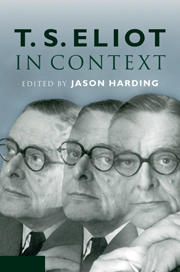Book contents
- Frontmatter
- Contents
- List of illustrations
- List of contributors
- Acknowledgements
- List of abbreviations
- Introduction
- PART ONE LIFE
- PART TWO FORMS
- PART THREE LITERARY CROSS-CURRENTS
- PART FOUR POLITICS, SOCIETY AND CULTURE
- PART FIVE RECEPTION
- 34 Contemporary reviews
- 35 Contemporary and post-war poetry
- 36 Eliot studies
- 37 Legacies: from literary criticism to literary theory
- Further reading
- Index
36 - Eliot studies
Published online by Cambridge University Press: 05 August 2012
- Frontmatter
- Contents
- List of illustrations
- List of contributors
- Acknowledgements
- List of abbreviations
- Introduction
- PART ONE LIFE
- PART TWO FORMS
- PART THREE LITERARY CROSS-CURRENTS
- PART FOUR POLITICS, SOCIETY AND CULTURE
- PART FIVE RECEPTION
- 34 Contemporary reviews
- 35 Contemporary and post-war poetry
- 36 Eliot studies
- 37 Legacies: from literary criticism to literary theory
- Further reading
- Index
Summary
T. S. Eliot shocked his Bloomsbury friends when he entered the Anglican Church in 1927, and these shock waves still roll through Eliot Studies today. The animus against Eliot's religious and political traditionalism motivates a good deal of academic commentary, as does the reaction against Eliot's fame and authority; for example, Cynthia Ozick's sophomoric declaration of independence from the master, or Harold Bloom's recollection that he entered a profession ‘virtually enslaved’ by Eliot's ‘preferences and prejudices’. While contemporary reviews (see Chapter 34 above) opened up most of the issues that we still debate – nor should we forget the engagement with Eliot represented by the work of many modern poets (see Chapter 35 above) – academic criticism made Eliot's oeuvre central to the growth of a school of literary criticism, New Criticism, which became a dominant force in American universities by the mid twentieth century. Eliot's allusive and difficult style was particularly suited to intensive university study and it encouraged source hunting: Grover Smith's encyclopaedic T. S. Eliot's Poetry and Plays (1956) remains a work that must be consulted by Eliot scholars. Excellent monographs by academic critics, such as Helen Gardner's The Art of T. S. Eliot (1949) and Hugh Kenner's The Invisible Poet (1959), helped to raise Eliot to the peak of his prestige and, in the decades following the poet's death in 1965, further general studies and detailed analyses by many first-rate critics – including Denis Donoghue, Frank Kermode, Christopher Ricks, A. D. Moody, Ronald Bush, Ronald Schuchard and others too numerous to mention – have not been superseded by later critics: to adapt Eliot's essay on tradition, ‘they are that which we know’ (SE, 16).
- Type
- Chapter
- Information
- T. S. Eliot in Context , pp. 370 - 380Publisher: Cambridge University PressPrint publication year: 2011



